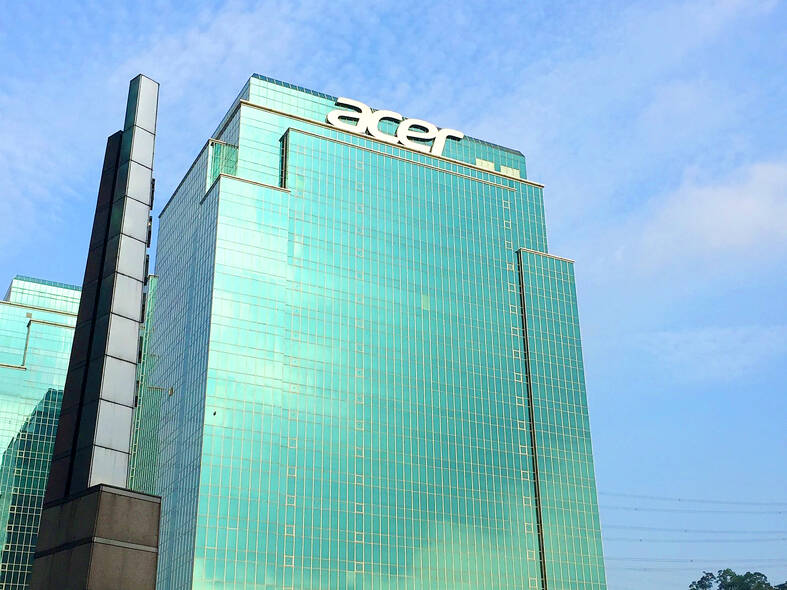Acer Inc (宏碁) on Thursday posted a net profit of NT$1.39 billion (US$43.86 million) for the second quarter, up 170.2 percent from a quarter earlier, with earnings per share of NT$0.46, compared with NT$0.17 in the first quarter, with analysts saying rush orders had led to a rebound in demand.
The company’s gross margin — the difference between revenue and the cost of goods sold — rose to 10.7 percent in the second quarter from 10.2 percent in the first quarter.
Its consolidated sales were also up 11.1 percent from the same period last year to NT$58.26 billion, it said.

Photo: Vanessa Cho, Taipei Times
“The company has weathered the post-pandemic industry stress test. Acer’s computer business bottomed out around May this year, while new graphic cards and connectivity products have reached markets,” Acer said in a statement.
“Acer’s computers, displays and most of the other businesses have all contributed toward revenues and profitability,” the statement said.
Acer said it has diversified its business by adding 10 subsidiaries, and more are expected, including a planned initial public offering of Acerpure, an air purifier brand.
In addition, Acer’s board approved a plan to invest in C-Life Technologies Inc (長利科技), a maker of lithium iron phosphate battery cells, that would expand the company’s foothold in the energy storage sector.
Acer said it is planning to acquire up to 13 million C-Life Technologies shares, or an about 11 percent stake in the company, at NT$30 per share.
Founded in 2009, C-Life Technologies is experienced in developing and manufacturing lithium iron phosphate battery cells and continues to develop new products such as battery energy storage systems and products for electric vehicles, the company said.
C-Life Technologies completed its second-generation battery energy storage system design last year, and successfully installed a 1 megawatt energy storage system in its factory in January, it said.
“Through our long-term strategic investment in C-Life Technologies, we hope to expand our foothold in the energy storage industry, providing solutions from manufacturing to applications,” Acer chairman and chief executive officer Jason Chen (陳俊聖) said.
Meanwhile, in a filing with the Taiwan Stock Exchange on Thursday, Acer said it had disposed of 2.707 million Wistron Corp (緯創) shares at an average price of NT$103.05 for a total of NT$279 million from July 5 to Aug. 3.
Shares of contract electronics maker Wistron have surged in the past month because of an artificial intelligence boom on the local stock market before a technical pullback earlier this week.

CHIP WAR: Tariffs on Taiwanese chips would prompt companies to move their factories, but not necessarily to the US, unleashing a ‘global cross-sector tariff war’ US President Donald Trump would “shoot himself in the foot” if he follows through on his recent pledge to impose higher tariffs on Taiwanese and other foreign semiconductors entering the US, analysts said. Trump’s plans to raise tariffs on chips manufactured in Taiwan to as high as 100 percent would backfire, macroeconomist Henry Wu (吳嘉隆) said. He would “shoot himself in the foot,” Wu said on Saturday, as such economic measures would lead Taiwanese chip suppliers to pass on additional costs to their US clients and consumers, and ultimately cause another wave of inflation. Trump has claimed that Taiwan took up to

A start-up in Mexico is trying to help get a handle on one coastal city’s plastic waste problem by converting it into gasoline, diesel and other fuels. With less than 10 percent of the world’s plastics being recycled, Petgas’ idea is that rather than letting discarded plastic become waste, it can become productive again as fuel. Petgas developed a machine in the port city of Boca del Rio that uses pyrolysis, a thermodynamic process that heats plastics in the absence of oxygen, breaking it down to produce gasoline, diesel, kerosene, paraffin and coke. Petgas chief technology officer Carlos Parraguirre Diaz said that in

Japan intends to closely monitor the impact on its currency of US President Donald Trump’s new tariffs and is worried about the international fallout from the trade imposts, Japanese Minister of Finance Katsunobu Kato said. “We need to carefully see how the exchange rate and other factors will be affected and what form US monetary policy will take in the future,” Kato said yesterday in an interview with Fuji Television. Japan is very concerned about how the tariffs might impact the global economy, he added. Kato spoke as nations and firms brace for potential repercussions after Trump unleashed the first salvo of

SUBSIDIES: The nominee for commerce secretary indicated the Trump administration wants to put its stamp on the plan, but not unravel it entirely US President Donald Trump’s pick to lead the agency in charge of a US$52 billion semiconductor subsidy program declined to give it unqualified support, raising questions about the disbursement of funds to companies like Intel Corp and Taiwan Semiconductor Manufacturing Co (台積電). “I can’t say that I can honor something I haven’t read,” Howard Lutnick, Trump’s nominee for commerce secretary, said of the binding CHIPS and Science Act awards in a confirmation hearing on Wednesday. “To the extent monies have been disbursed, I would commit to rigorously enforcing documents that have been signed by those companies to make sure we get